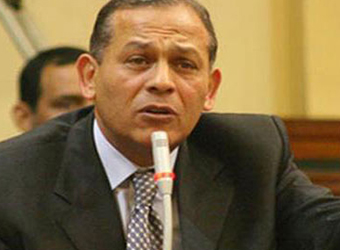Well-known liberal MP Anwar El-Sadat has denied accusations from other parliametnarians that he was involved in collecting and forwarding classified information to foreign institutions.
In a 140-page statement issued on Tuesday, El-Sadat said that he had not leaked a draft NGO law to foreign embassies nor forged the signatures of 16 MPs on two laws he drafted on criminal procedures and NGOs.
El-Sadat was questioned by both parliament’s ethics committee and the legislative and constitutional affairs committee. The ethics committee found him guilty and recommended on 12 February that he be stripped of his parliamentary membership.
The legislative and constitutional affairs committee, headed by MP and lawyer Baha El-Din Abu Shoqa, also questioned El-Sadat on Sunday.
Abu Shoqa said after El-Sadat was given one hour and half to defend himself, it was decided that he would be questioned again next Sunday.
Regarding the first accusation, El- Sadat said he had not leaked a copy of the government-drafted NGO law to the Dutch ambassador in Cairo.
“The draft of this law was made public several months ago, not to mention that the social solidarity ministry made it available on the internet so that civil society organisations could discuss it in a national dialogue,” said El-Sadat in his statement.
El-Sadat said that the Dutch ambassador himself had announced in a public statement that he had never met the MP in person.
“In addition, Minister of Social Solidarity Ghada Wali announced that the government had never sent a draft NGO law to parliament and what was finally approved by parliament was a NGO law which was drafted by MPs,” he wrote.
In response to the second accusation, El-Sadat said the constitution and parliament’s internal bylaws do not oblige MPs to collect signatures in support of laws they draft.
“Any MP can propose and submit a law without the stipulation that he must get signatures in support of this law from his colleagues,” wrote El-Sadat.
El-Sadat’s statement said “some MPs gave their signatures, but they decided later to withdraw their signatures.” It added that “another group of MPs gave signatures on behalf of other MPs because this is a normal procedure in parliament.”
“The problem is that the ethics committee took this as a case of forgery, but I insist that it is just a procedural matter that needs more investigation,” wrote the MP.
On the third accusation, El-Sadat’s statement denied that he had sent classified information to the Inter-Parliamentary Union (IPU).
“It was just a press statement and message to parliament speaker Ali Abdel-Aal and the IPU in both Arabic and English, urging him to do his best improving the performance of Egypt’s parliament,” said El-Sadat, arguing that “the constitution gives MPs the right to comment on the internal performance of parliament and propose recommendations aimed at improving this performance.”
“While I was exercising my right, the message I sent to speaker Abdel-Aal and the IPU was published by many Arabic and English websites,” said El-Sadat.
El-Sadat’s 140-page statement concluded by urging members of the legislative and constitutional affairs committee not to take a politicised stance against him.
“You should be wise, listening to the voice of reason only, taking your time and doing your best verifying information and accusations against me,” said El-Sadat.
The MP said he would submit his 140-page statement, with attachments, to the committee at its meeting next Sunday. “I hope they will read this statement carefully before they issue any judgment or recommendation,” he wrote.
Source: Ahram online



